Introduction to Revolutionary Ireland and Its Brewing Tradition
The Irish War of Independence (1919-1921), a pivotal moment in Ireland’s history, was not only a political and military struggle but also a period that showcased the resilience and ingenuity of the Irish spirit in various aspects of daily life, including its rich brewing tradition. Ireland, with its deep-rooted history of beer brewing that dates back to ancient times, found itself at a crossroads during the early 20th century. This era was marked by a fervent desire for national identity and freedom, which permeated all sectors of Irish society, including its breweries.
The tradition of brewing in Ireland is a tale as old as time, with beer being an integral part of Irish culture, economy, and social life. Before the war, breweries ranged from large, well-established companies to small, family-run operations, each playing a vital role in their communities. Beer was more than just a beverage; it was a symbol of hospitality, craftsmanship, and local pride. However, the onset of the Irish War of Independence introduced new challenges and opportunities for brewers. As the struggle against British rule intensified, breweries found themselves in a unique position. They were not only commercial enterprises but also centres of community gathering and, in some cases, clandestine activities supporting the fight for independence.
This introduction sets the stage for an exploration of how the brewing industry navigated the turbulent waters of political change, economic uncertainty, and societal upheaval. “Hops and Heroism” will delve into the stories of resilience behind the pints, examining how beer brewing during the Irish War of Independence was intertwined with the broader narrative of Ireland’s quest for self-determination. From the role of breweries in the local economy and community to their involvement in the resistance, and the lasting legacy of this period on modern Irish brewing, we will uncover the untold tales of beer and heroism that brewed in the heart of revolutionary Ireland.
Brewing as a Form of Resistance
During the tumultuous years of the Irish War of Independence, the act of beer brewing transcended its traditional role in Irish society to become a symbol and sometimes a tool of resistance against British rule. This segment explores how breweries, both large and small, navigated the complexities of operating during a period of significant political unrest and how their activities reflected the broader struggle for Irish independence.

The Economic and Social Anchor
Breweries in early 20th century Ireland were more than mere production facilities; they were pivotal to the local economy and social fabric. Employing a significant portion of the community and fostering a culture of camaraderie, breweries often became informal meeting spots for locals. In a time when Irish identity was fiercely guarded, these establishments offered a sense of normalcy and belonging amidst the chaos. Moreover, the economic stability provided by breweries, through jobs and commerce, was a subtle yet potent form of resistance. By sustaining communities, they indirectly supported the resilience of the Irish population against British economic pressures.
Covert Operations and Support
As the war intensified, several breweries found themselves involved in the nationalist movement, albeit in covert manners. The widespread network of breweries and their connections with local communities made them ideal for more than just brewing. Some became clandestine meeting places for Irish revolutionaries, where strategies were devised under the guise of casual gatherings. Others reportedly hid weapons and supplies among barrels and sacks of grain. These actions, while risky, underscored the breweries’ commitment to the cause, blending the craft of brewing with the craft of rebellion.
Symbolism and Morale
The act of brewing and consuming Irish beer also took on symbolic dimensions during the War of Independence. Choosing to drink locally brewed beer over imported British ales was a quiet declaration of allegiance to the Irish cause. This preference not only supported local businesses but also served as a morale booster, reinforcing a sense of national pride and unity. In dark times, the simple act of sharing a locally brewed pint became a statement of hope and defiance.
Challenges and Adaptation
Operating during the war was fraught with challenges. Raw materials like barley and hops became scarce, and restrictions on movements hindered distribution. Breweries adapted in various ways, from altering recipes to accommodate available ingredients to using covert methods to distribute their products. These adaptations were not just about survival but also about maintaining a semblance of normalcy and continuity for their communities.
The Brewing Spirit of Resistance
The resilience of the brewing industry during the Irish War of Independence is a testament to the indomitable Irish spirit. Beyond the economic contributions and the covert support for the nationalist cause, breweries played a vital role in maintaining community morale. The persistence of brewers and their dedication to their craft amidst such turmoil exemplified the broader Irish resistance movement’s creativity and determination.
This period of strife and struggle did not just shape the political landscape of Ireland; it also left an indelible mark on its brewing tradition. The breweries that weathered the storm emerged not just as businesses, but as symbols of Irish resilience and defiance, their stories woven into the fabric of Ireland’s rich history.
Brewing Symbolism
During the Irish War of Independence, the act of brewing beer transcended its traditional economic and social roles, morphing into a subtle yet potent form of resistance against British control. This period was characterized by widespread civil disobedience and guerrilla warfare, with the Irish people employing various methods to assert their identity and autonomy. Among these, beer brewing emerged as a unique front in the struggle for independence.
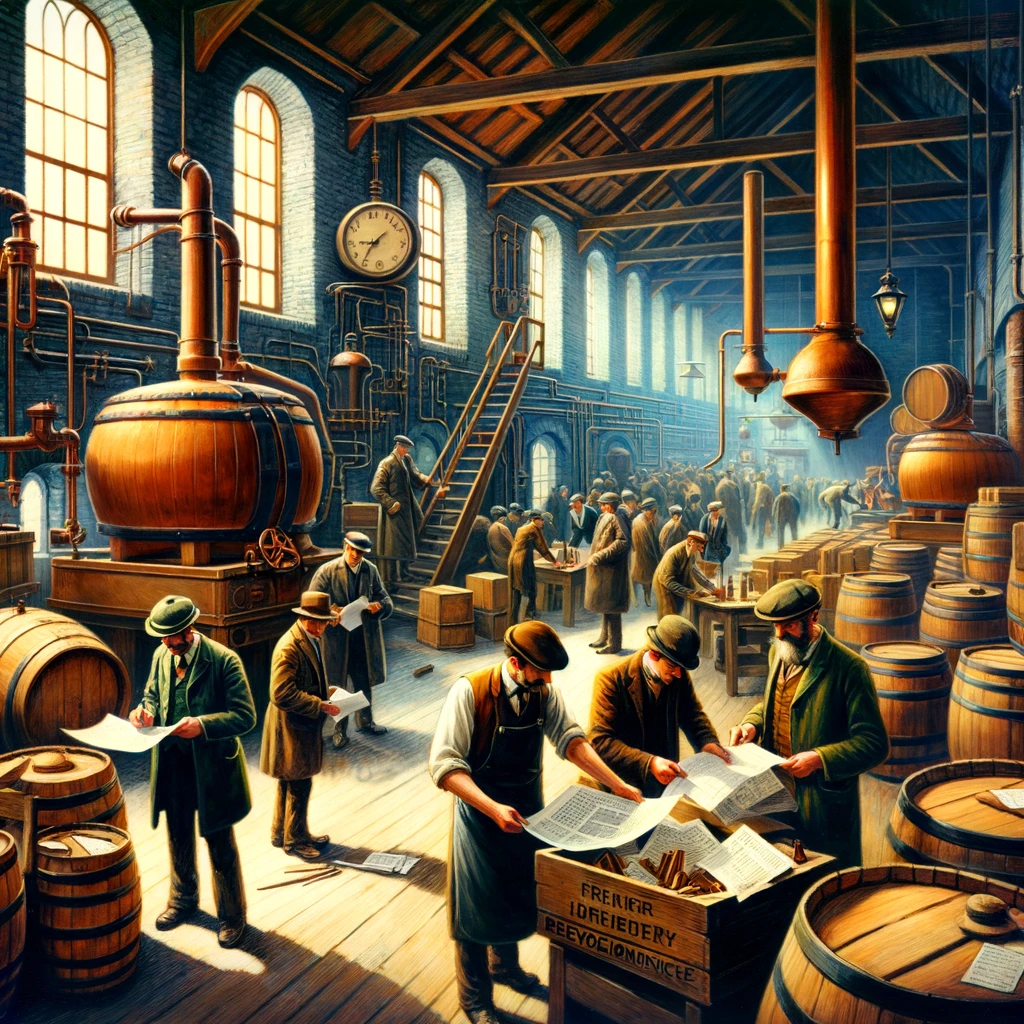
The Symbolic Rebellion in a Pint
For centuries, beer had been an integral part of Irish culture, a symbol of community and craftsmanship. However, in the context of the war, it gained new significance. Brewing became an act of defiance, a way for the Irish to preserve their heritage and resist cultural assimilation. It was not just about producing a beverage; it was about maintaining a way of life in the face of external pressures to conform. By choosing to brew and consume their beer, Irish people were not just enjoying a drink; they were making a statement.
Economic Impact and Self-Sufficiency
The brewing industry also played a critical economic role during the war. With the British imposing taxes and restrictions on various goods, including alcohol, the production and sale of beer became a means of supporting the local economy independently. Breweries, many of which were family-owned and operated, became centres of self-sufficiency, providing employment and supporting local agriculture by sourcing ingredients like barley and hops from nearby farms. This economic resilience further undermined British efforts to control and exploit Irish resources.
Breweries: Hubs of Resistance and Community
Some breweries went beyond economic support and became directly involved in the nationalist cause. These establishments often served as meeting places for revolutionaries, where strategies were discussed over pints of ale. The breweries’ inherent connection to their communities made them trusted venues for such clandestine activities. In several instances, breweries even hid weapons and harboured fugitives, playing a more active role in the fight against British rule. The loyalty and solidarity within these communities were integral to the broader resistance movement, with breweries at the heart of this network.
The Legacy of Resilient Brewing
The resilience of the brewing industry during the Irish War of Independence is a testament to the indomitable spirit of the Irish people. Despite the challenges of war, including shortages of ingredients and the constant threat of British raids, Irish brewers persisted. They adapted their methods, sometimes creating new recipes to work with whatever resources were available. This ingenuity ensured that beer production continued throughout the war, sustaining both the morale and the economy of the Irish people.
The act of brewing beer during the war was a multi-faceted form of resistance. It was an economic necessity, a symbol of cultural identity, and a direct contribution to the nationalist cause. This period of adversity and defiance highlighted the importance of beer in Irish society, not just as a beverage, but as a beacon of hope and a source of strength. The legacy of this era continues to influence Irish brewing today, with a renewed appreciation for the craft and its historical significance.
Notable Breweries and Brewers of the Time
The Irish War of Independence was not only a battlefield for soldiers but also for the common people who fought their battles in the shadows, among them the brewers, who played a significant role in both the economic and social aspects of the Irish struggle. This section delves into the stories of notable breweries and brewers who left their mark during this tumultuous time, highlighting their contributions to the cause and how their operations were affected by the conflict.
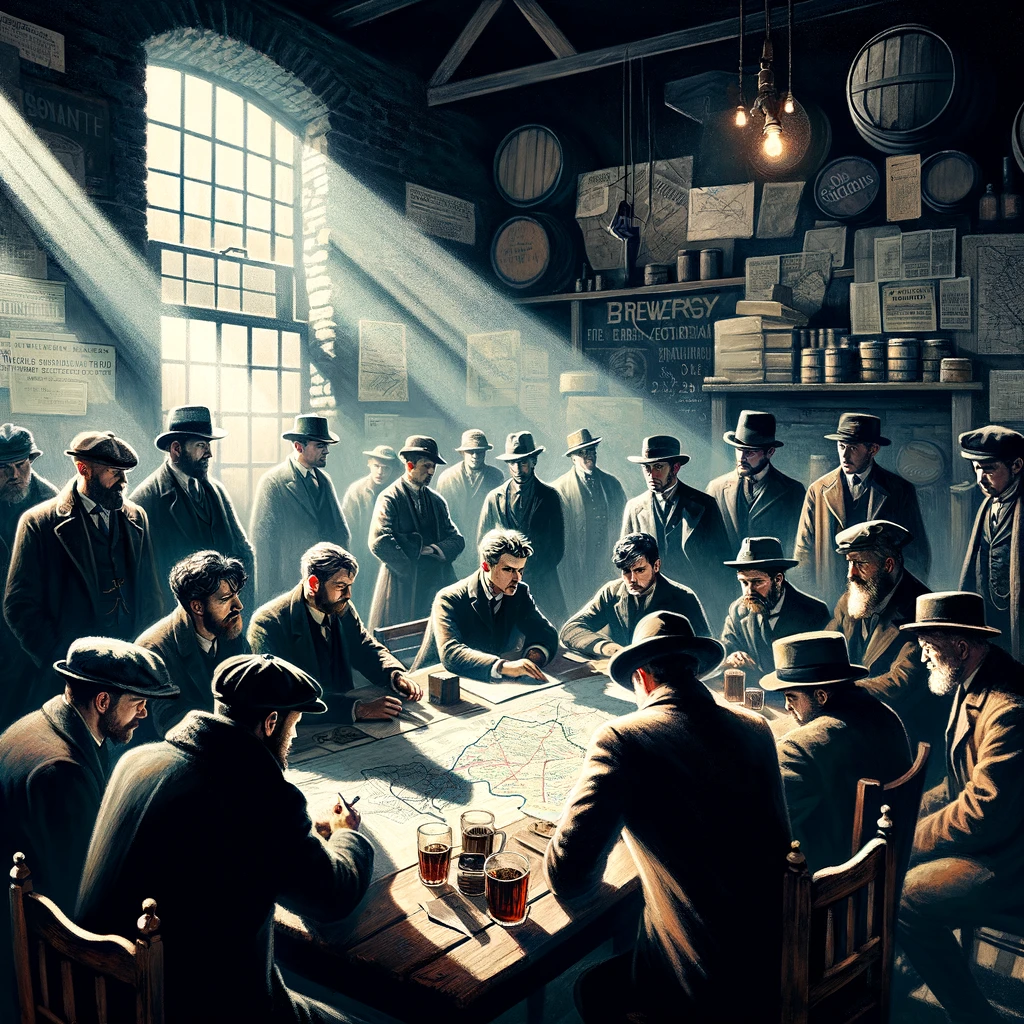
The Backbone of the Resistance: Brewery Leaders
One cannot discuss the brewing industry during the Irish War of Independence without mentioning some key figures who were instrumental in weaving the narrative of resistance through their craft. These individuals were not just brewers; they were patriots who understood the power of unity and the importance of sustaining Irish culture and economy through one of its most cherished traditions – beer brewing.
- John Smithwick and the Legacy of Smithwick’s Brewery: Founded in the early 18th century, Smithwick’s Brewery in Kilkenny became a symbol of Irish resilience. John Smithwick, running the brewery during these trying times, navigated the tumultuous waters by keeping the brewery operational, thus ensuring local employment and contributing to the morale of the community. The brewery also served as a covert meeting place for Irish revolutionaries, where plans were whispered over the clinking of glasses.
- The O’Connell Family and Their Brewing Dynasty: In Dublin, the O’Connell family’s brewery was another beacon of hope. Known for their staunch support of the Irish cause, the O’Connells used their brewery as a front for revolutionary activities, smuggling messages and arms in barrels of beer. Their contributions went beyond the brewing industry, as they provided financial support to families affected by the war.
Brewing Through Adversity
The war posed numerous challenges for brewers, from raw material shortages due to blockades to the constant threat of raids by British forces looking to quash any semblance of rebellion. Yet, these breweries persisted, adapting their techniques and recipes to suit the circumstances. They were a testament to the Irish spirit of perseverance, demonstrating that even in the face of adversity, the people’s resolve would not be dampened.
A Toast to Freedom
As the war waned and Ireland stepped into a new era of independence, these breweries and brewers did not fade into the background. Instead, they emerged stronger, their stories woven into the fabric of the nation’s history. They were not just witnesses to history; they were active participants who used their craft to contribute to the birth of a free Ireland.
Today, many of these breweries continue to operate, their histories a poignant reminder of a time when brewing beer was as much an act of rebellion as it was an act of creation. They serve as a testament to the enduring legacy of those who, through their dedication to brewing, contributed to the Irish War of Independence in their unique way.
Impact of the War on Beer Production and Distribution
The Irish War of Independence had a profound impact on all facets of Irish life, including the brewing industry. The war not only disrupted the daily operations of breweries but also posed significant challenges to beer production and distribution. This section examines how brewers navigated these turbulent times, the changes in beer consumption patterns, and the adaptability of the industry.
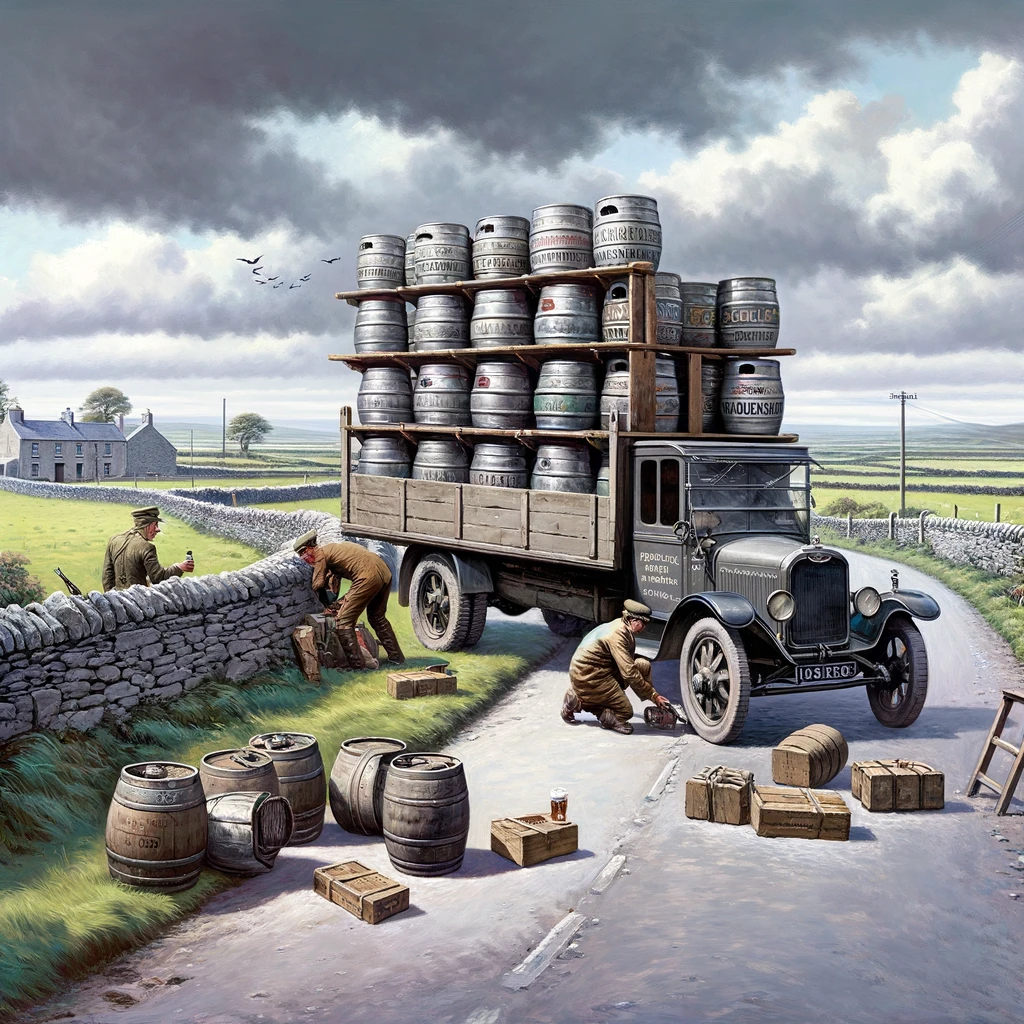
Brewing Under Siege
The conflict brought about strict rationing, trade embargoes, and a scarcity of essential brewing ingredients like hops and barley. Breweries were often caught in the crossfire, both literally and figuratively, as British forces targeted them for supplying the Irish volunteers. In response, brewers had to innovate to survive. This meant altering recipes to suit available ingredients, leading to the creation of unique wartime brews that, while perhaps not as refined as peacetime beers, held a special place in the hearts of the Irish people for their symbol of resilience.
Distribution: Dodging Blockades and Checkpoints
The distribution of beer also faced its own set of challenges. British forces, aware of the breweries’ support for the Irish cause, frequently raided and blockaded roads, making the transportation of beer a risky endeavour. Ingenious methods were developed to circumvent these obstacles, including the use of hidden compartments in delivery trucks and the old tactic of smuggling barrels in plain sight, disguised as other goods. These efforts ensured that, despite the odds, beer continued to flow throughout Ireland, sustaining both the morale of the people and the rebel forces.
Shifts in Beer Consumption
The war also led to shifts in beer consumption patterns among the Irish population. With the scarcity of ingredients and the general atmosphere of austerity, there was a move towards lighter beers that required fewer resources to produce. Moreover, the communal spirit of the struggle saw a rise in the sharing of homebrews, fostering a sense of unity and self-reliance among communities. This period also saw the emergence of “speakeasies” in Ireland, where beer was secretly sold and consumed, further embedding the culture of resistance associated with brewing.
Post-War Recovery and Adaptation
Following the war, the brewing industry faced the monumental task of rebuilding and adapting to the new socio-economic landscape. The end of British restrictions allowed for the resurgence of traditional brewing practices and the importation of quality ingredients. This recovery phase was marked by innovation and a return to quality, setting the stage for the modern Irish brewing renaissance. The war’s legacy left an indelible mark on the industry, with many of the wartime innovations and the spirit of resilience becoming central to the identity of Irish brewing.
A Testament to Endurance
The story of beer production and distribution during the Irish War of Independence is a testament to the endurance and ingenuity of the Irish people. Faced with adversity, the brewing industry not only survived but also played a pivotal role in supporting the fight for independence. This period of challenge fostered a deep sense of community and pride in Irish brewing, which continues to influence the industry to this day.
Legacy of Brewing Post-Independence
The aftermath of the Irish War of Independence brought significant changes to Ireland, not least in the realm of beer brewing. The industry’s resilience and ingenuity during the war laid the foundation for a brewing renaissance that would eventually position Ireland as a beacon of brewing excellence on the global stage. This concluding section explores the enduring legacy of brewing in post-independence Ireland and how the war’s trials and tribulations shaped the future of Irish beer.
A Renaissance of Irish Brewing
In the years following independence, Ireland witnessed a resurgence in the brewing sector. Freed from the constraints of British taxation and trade restrictions, Irish brewers began to reclaim and reinvent traditional brewing practices. The war had fostered a spirit of innovation and self-reliance among brewers, which now drove them to experiment with new styles and techniques. This period saw the revival of age-old recipes and the birth of new flavours that reflected the unique character of an independent Ireland.
The Rise of Craft Brewing
The legacy of the war also paved the way for the emergence of craft brewing in Ireland. The hardships faced by breweries during the conflict highlighted the importance of local sourcing and community support. These principles became central to the ethos of the craft brewing movement that began to take shape in the late 20th century. Today, Ireland boasts a vibrant craft beer scene, with microbreweries and artisanal brewers drawing inspiration from the nation’s rich brewing heritage while pushing the boundaries of innovation.
Global Influence and Pride
The resilience of the Irish brewing industry during the war contributed to the global reputation of Irish beer. Brands that survived and thrived during those tumultuous times became symbols of national pride, their stories resonating with audiences worldwide. Irish stouts, ales, and lagers are now celebrated for their quality and heritage, with Ireland’s brewing history adding depth and character to every pint poured around the globe.
Preserving Tradition While Embracing Change
The legacy of brewing post-independence is a testament to the balance between preserving tradition and embracing change. Irish brewers have maintained the spirit of community and craftsmanship that defined their war-time efforts while adopting modern techniques and sustainability practices. This approach has ensured that Ireland’s brewing legacy continues to evolve, reflecting both the enduring strength of its past and the dynamic promise of its future.
A Toast to Freedom
The story of beer brewing during the Irish War of Independence and its aftermath is more than just a chapter in Ireland’s economic history. It is a narrative of resilience, creativity, and unity. As Ireland forged its path as a sovereign nation, its brewing industry became a symbol of independence, reflecting the country’s struggles and triumphs. The legacy of brewing post-independence serves as a reminder of how adversity can foster innovation and how a nation’s spirit can be encapsulated in the simple act of brewing a pint.



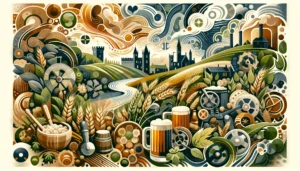
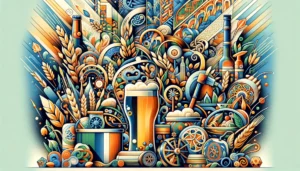
Be First to Comment